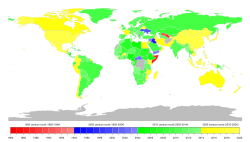Census
A census is a way of getting information about every member of a population. It is usually used for a population of people, but can be used to mean a population of animals. Both the United States and United Kingdom have a census every 10 years, or decade. But in Australia, Canada, Japan[1] and New Zealand they have it every 5 years.
A census produces a large database and sometimes new information technology, such as the use of punched cards for data, has been invented to handle it.
The word comes from the Roman Republic when it meant a list of citizens it was used to keep track of adult males fit for military.
Census is a word of Latin origin which means to evaluate/assess or to estimate.
Census Media
A census taker visits a family of Indigenous Dutch Travellers living in a caravan in the Netherlands in 1925.
An early 13th-century mosaic in the Chora Church depicting the Virgin Mary and Saint Joseph registering for the Census of Quirinius
The Tehran census in 1869
An enumerator conducting a census survey using a mobile phone-based questionnaire in the rural Mutasa District in Zimbabwe in 2015
The League of Nations and International Statistical Institute estimates of the world population in 1929
A census taker interviews a resident of Dasmariñas, Philippines, in October 2020.
Notes
- ↑ "OUTLINE OF THE 2015 POPULATION CENSUS OF JAPA" (PDF). Statistics Bureau, Ministry of Internal Affairs and Communications of Japan.
Related pages
Other websites
- Statistics Bureau of Japan - Official website






